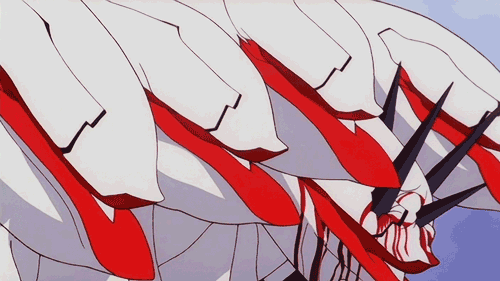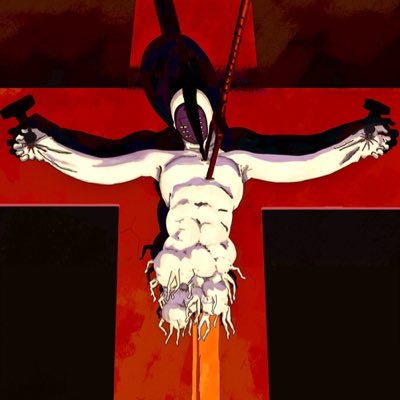The List
Get to Know Seven of Evangelion's Angels
by Lynzee Loveridge,

Neon Genesis Evangelion is one of the most influential anime series of all time and after spending far too long out of print, is finally available again in the U.S. courtesy of Netflix as of Friday, June 21st. What makes the series so evocative all these years later is the emotional core of its characters but beyond that is the amazing world-building. Anno and his team crafted a multitude of interesting angles to approach the show, including monsters inspired by theoretical science and a lot of references to Christian mythos. Neon Genesis Evangelion dabbles in Kabbalah and Gnosticism as window dressing around its larger emotional themes.
If you look at Christianity as a sort of fandom, we can call The Bible "canon." However, there's a lot of really, really old "fanfiction" (apocrypha) that didn't make the cut into the True Word. This includes angelology (and demonology) that lays out hierarchies of Heaven and Hell. Medieval writers loved this shit and the ideas extend into a lot of pop culture today. Pick up any copy of any manga that concerns itself with demons, angels, King Solomon, alchemy, or the like to see how writers Thomas Aquinas and the De Coelesti Hierarchia live on today. The fascination with classifying celestial beings also means it's difficult to whittle down what's historical and what's yet another book of pseudo-occult babble muddying the waters, but that's me being particular (and yet another reason why I was kicked out of coven about 10 years ago).
Neon Genesis Evangelion's many, many Christian elements are fun as another way to approach the series but knowledge isn't 100% necessary to enjoy the show. I'm keeping this rundown of Eva's Angels as spoiler free as possible, but we'll be looking at older descriptions of angels and how that may have played a part in the series' designs and the monsters' personalities.

Sachiel

Perhaps our most precious angel. Sachiel is Evangelion's defacto "yuru" mascot. At some point, it was decided that Sachiel is just a weak, lovable little baby and a simplified version of him as appeared on merchandise ever since. In the anime he's humanoid and the first Angel to attack in the story's current timeline (not a flashback). It also is first to use what would become an iconic symbol during the show's run; a crucifix-shaped beam.
Sachiel's name means "the covering of God" and appears in early Jewish occult books circa 1200s and again in the The Heptameron grimoire in the 16th century although his origins are even earlier. The Book of Enoch places him with the Archangels (like the more widely known Michael, Uriel, and Raphael). There aren't any stories of Sachiel interacting with humans, instead he's listed in occult books in a similar fashion as gods from the Greek mythos. They advise envoking or praying to Sachiel for help with legal matters and money.
Shamshel

Everyone's phallic monster. Despite my best attempts to unearth the truth, I can't explain to you why Yoshitoh Asari designed Shamshel the way that he did. Its two whip arms remind me vaguely of flagellum found on bacteria. The creature has both flight and attack modes, fighting primarily with its light whip arms.
The choice to call it Shamshel might be connected to these weapons which are shown to quickly burn its foes. The name means "sun of God" and he's described the Jewish mystical text Zohar as the angel that guarded the Garden of Eden. Genesis 3:24 describes the angel stationed at the Garden of Eden as wielding a flaming sword.
Ramiel

Ramiel is one of my favorite angel designs from the series. He encompasses an idea of sacred geometry and self-reflection while melting everything in its path. When it hones in on its target it can annihilate it with precision and tunnel after it.
Ramiel is described in The Book of Enoch, an apocraphyl text allegedly written by the great-grandfather of Noah (yeah, the one with the Ark). The book fleshes out the mythology of fallen angels, angels that were corrupted in their association with humans, and their giant offspring (Nephilim). These were the events said to lead up to the flood that Noah built that boat for. Ramiel is described as one of the leaders of these fallen angels. In the Apocalypse of Baruch he's credited with ruling over "true visions." Ramiel's design could allude to this, but most likely it was just Anno's shout out to Future Police Urashiman.
Israfel

And they say (the starry choir-Edgar Allen Poe's Israfel
And the other listening things)
That Israfeli's fire
Is owing to that lyre
By which he sits and sings—
The trembling living wire
Of those unusual strings.
Israfel is one of the few angels where its origin seems to have played a larger part in the episode themes as a whole. Israfel, as demonstrated in Poe's poem, is associated with music. Some stories think of him like a muse that musicians could pray to for inspiration. The 14th century Arabic text The Wonders of Creation shows Israfel (Israfil) playing a trumpet. The text states that he's the angel that will blow the trumpet to initiate the death of all livings on Earth (yeah, that took a dark turn, didn't it?). While awaiting God's orders to end all life, Israfel cries at the sight of Hell and is said to have tutored Muhammad.
In the episode, Israfel splits in half, prompting Asuka and Shinji to have to synchronize together to defeat both at the same time. How do they do it? Jazzercise.
Sandalphon

I have a soft spot for Sandalphon because his name is fun to say and he was a very creepy baby in the Angel Sanctuary manga. He's also a creepy baby in Evangelion before transforming into a prehistoric fish. He even cries like a human child. So what's up with Sandalphon and babies? The story goes that Sandalphon was originally the human prophet Elijah but he took on his new angelic form after ascending to Heaven. Elijah is associated with the unborn and children; Jewish tradition saves a special seat for Elijah to oversee circumcision ceremonies (this is sort of a punishment bestowed on Elijah though). As Sandalphon, he's said to be able to reach any part of the Earth (even volcanoes, according to Evangelion).
Tabris

You'll notice that Tabris here, aka Kaworu, has a name different than the earlier angels. The names of angels come from Theophory, the act of embedding the name of a deity within a name. This is usually done by adding -el to a name in the Judeochristian tradition. There is not any "god" in "Tabris" though, unlike the other angels. Tabris (sometimes written Thabris), however, originates from two different stories. One is a romance starring Moses and the other is the occult book The Nuctemeron by Apollonius of Tyana. The Moses story is interesting as a potential influence for Shinji and Kaworu's relationship.
A few lines in the Bible allude to Moses having a previous wife named Tharbis, a princess of what is now Ethiopia. Moses was leading an invading force of Egyptians and won. The Princess Tharbis watched as Moses fought her people and fell in love with him. Perhaps a marriage out of convenience, Moses agreed to marry Tharbis if she would give him the city of Mer. But Moses didn't want to stay in Mer, he planned to return to his land of Egypt. Tharbis protested so Moses looked for a way to, essentially, divorce his wife. He used magic to craft a pair of rings and gave one to Tharbis that would cause her to forget him while he wore the ring that would never allow him to forget. The memory of her romance gone, Moses was free to leave Ethopia and return to Egypt.
The Nuctemeron identifies Tabris as the "genius of free will" (genius here is used as a singular for "genii" or "genie") and one of the rulers of the sixth hour. When performing magic, seals, hours, cardinal directions, elements, planets, etc are referenced quite often to make sure your evocation is performed under all the right conditions. The 19th century French magician Eliphas Levi interpreted Apollonius of Tyana's writings about Tabris as "the magus is free; he is the occult king of the earth." A pretty apt description of the wisdom Kaworu tries to pass on to Shinji.
Lilith

Mankind is so cruel to its originator, but Lilith is a controversial figure in mythology. She's come to represent a variety of things whether it be demons or feminism. The story always starts the same: Lilith is the first partner created for Adam but unlike Eve, she's made from the same dirt as her would-be husband. She rebukes him and thus is cast out. The Mesopotamians had a whole class of demons named after Lilith and legends told of her promiscuity and baby-napping. Some Jewish folklore says that after she denies Adam she strikes up a romance with the angel Samael, archangel of death. Her name is popularly used for vampire or generally seductive characters.
She's had a bit of a redemption arc over the years as her story has been re-purposed to represent independent women and her subsequent demonization merely a reflection on how society views said women.
Lilith's place as a demon in mythology can be extrapolated out as a larger metaphor within Evangelion. If humankind is her progeny, what does it say about humans or Angels or monsters? Personally, I see her as a pitiable character given her state in the series and how her body (and blood) are used. It's reminiscent of Shel Silverstein's The Giving Tree poem, just you know, creepier.
Watch Neon Genesis Evangelion! (Twitter.)
discuss this in the forum (11 posts) |